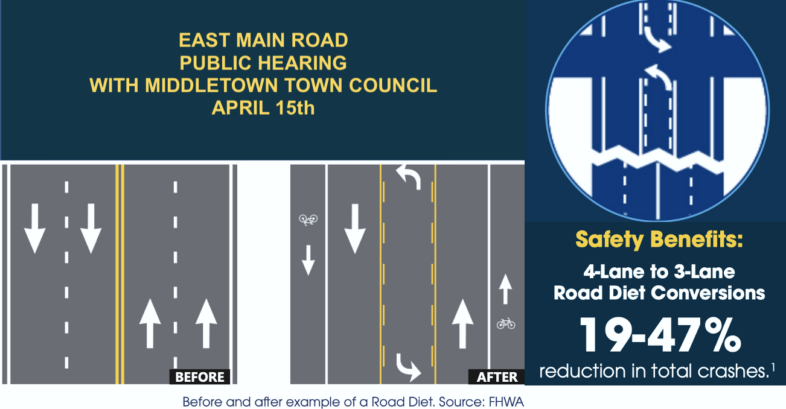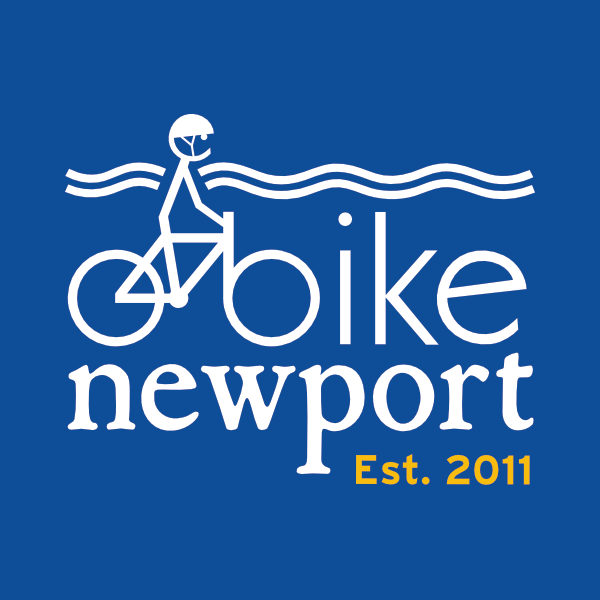
updated 4/11/24
The discussion taking place regarding Aquidneck Island’s East Main Road is about safety measures that can be implemented as part of the upcoming repaving. Are the lane changes that will improve safety right for East Main Road? The Middletown Town Council will hold a Public Hearing on Monday, April 15th to hear from the public.
Please come and share your thoughts about improving safety on East Main Road.
Middletown Town Council Meeting
April 15th, 6:30pm
The Meeting Agenda is HERE.
Middletown Town Hall / 350 East Main Road, Middletown, RI
What is a Road Diet and why is it recommended?
East Main Road sees more than 200 crashes every year – 1400 in six years according to a RIDOT road safety assessment as reported by Newport Daily News in 2021.
The Federal Highway Administration recommends Road Diets as a priority countermeasure to reduce crashes and improve safety.
- A Road Diet refers to the decrease from 4 lanes of travel to 2 lanes of travel plus a center turning lane.
- The purpose of a Road Diet is to improve safety.
- Road Diets reduce crashes by 19-47% and are highly recommended by US DOT and the Federal Highway Administration as a preferred safety countermeasure.
- With Road Diets, the center turning lane removes stress points for making left turns. The need to make a turn across active traffic from an active travel lane, the urgency to change lanes to avoid stopped cars, and the need to cross two lanes of active traffic to make a left turn entering the road are all made easier and safer – by providing a place for drivers to go to complete their maneuver.
- The road bed freed up by the Road Diet creates needed shoulders that can be used for bike lanes, pedestrian islands, and corridors for people to get more safely to and from the bus.
- Implementing the Road Diet at the same time as resurfacing means it can be added at no additional cost.
Common Misconceptions About Road Diets:
Reprinted from “Debunking Road Diet Myths” by Federal Highway Administration
- “If you remove a travel lane, then traffic will back up.”
This is false. Road Diets typically do not adversely affect travel times within a corridor; rather, clearing clogged travel lanes of left-turning traffic actually improves operations. - “Road Diets are too narrow for large vehicles.”
This is false. In fact, Road Diets present an opportunity to re-plan the roadway space for large vehicles by including delivery parking areas, improved intersection turning radii, and protected bus pullouts for pickup or drop-off. Road Diets can also incorporate wider shoulders, which increase the space between pedestrians and large vehicles. - “Road Diets delay emergency response times.”
This is false. Road Diets can improve emergency response times. A two-way left-turn lane and wide shoulder areas allow traffic to move aside more quickly. The center turn-lane provides a predictable path for the emergency response vehicle.
The East Main Road Repaving Project:
- East Main Road is scheduled to be repaved – from Aquidneck Avenue in Middletown to Turnpike Avenue in Portsmouth.
- The current plan addresses the Middletown section first in 2024, and Portsmouth to follow.
- Ride Island recently proposed to the Town of Middletown that they consider adding a Road Diet to the pavement plan – to improve safety and reduce crashes on the road.
- The Town of Middletown discussed this proposal at two Council meetings – on March 4th and on April 1st, and have scheduled a Public Hearing for April 15th.
- RIDOT alerted the Town of Middletown that if they want to add a Road Diet to the plan they would have to make that decision by April 19th.
Does East Main Road qualify for a Road Diet?
The Road Diet is proposed as a prioritized safety measure and we feel that East Main Road meets the qualifications set by Federal Highway. East Main Road recorded 17,500 average vehicles/day in the Spring of 2018 and 21,000 in the Summer of 2023. In Proven Safety Countermeasures, Federal Highway states “typically a Road Diet is implemented on a roadway with a current and future average daily traffic of 25,000 or less.” The very high number of crashes annually combined with speeds regularly in excess of the speed limit qualify East Main Road for this proven safety design.
RIDOT has not endorsed the Road diet based on these numbers and a preference for implementing Road Diets only on roads with far lower numbers of cars. Additionally, RIDOT reports have shown backups of cars at peak hours. Ride Island has been studying the reports and found significant concerns with the model files and simulations that demonstrate the backups and longer delays. We brought the concerns to RIDOT and we are working closely with RIDOT to run updated models so that the community has the best information possible.
Ride Island also holds the view, along with most residents, that improved safety is far more important important than protecting faster travel times, most above the speed limit.
The Road Diet is proposed now because, to quote the Federal Highway Administration, “a Road Diet can be a low-cost safety solution when planned in conjunction with a simple pavement overlay, and the reconfiguration can be accomplished at no additional cost.”
Middletown Town Council’s Main Questions –
The Middletown Councilors posed a number of questions at the meetings leading up to the April 15th Public Hearing. Ride Island is preparing a report for the Middletown Town Council and the public which will provide information to answer these questions and more. The report will be shared with the public here on this web site and on social media.
- Will a Road Diet cause a backup of traffic?
- Will a Road Diet on East Main Road send cars to West Main Road
- Will bike lanes put bicyclists in danger?
- Will there be adverse impact on emergency responders?
- How will drivers get around farm equipment?
- Will requesting the Road Diet delay the paving project?
- Will the traffic diet extend into Portsmouth?
What part of East Main Road is affected? and how does Portsmouth fit in?
The pavement project scheduled to begin soon is in Middletown only – from Aquidneck Avenue to Mitchell’s Lane. If Middletown requests the Road Diet, then RIDOT will look at the road and determine where the Road Diet should begin and end. If the Road Diet recommendations extend into Portsmouth, then RIDOT will present that recommendation to the Town of Portsmouth. In anticipation of that step, and to let Middletown know that they would work together if the opportunity presents, the Portsmouth Town Council voted on April 8th to express support of Road Diets as a priority road safety measure in principle.
What You Can Do:
- Stay informed. Read the available information and consider your opinion of how we can and should address safety on our roads. Questions are important so we can make informed decisions as a community.
- Engage your community in the discussion. What are our priorities on our roads? What do we value most?
- Contact your Middletown Town Councilors and share your thoughts.
- Attend the Middletown Town Council Meeting on Monday April 15th. Agenda HERE.

 Bike Newport
Bike Newport